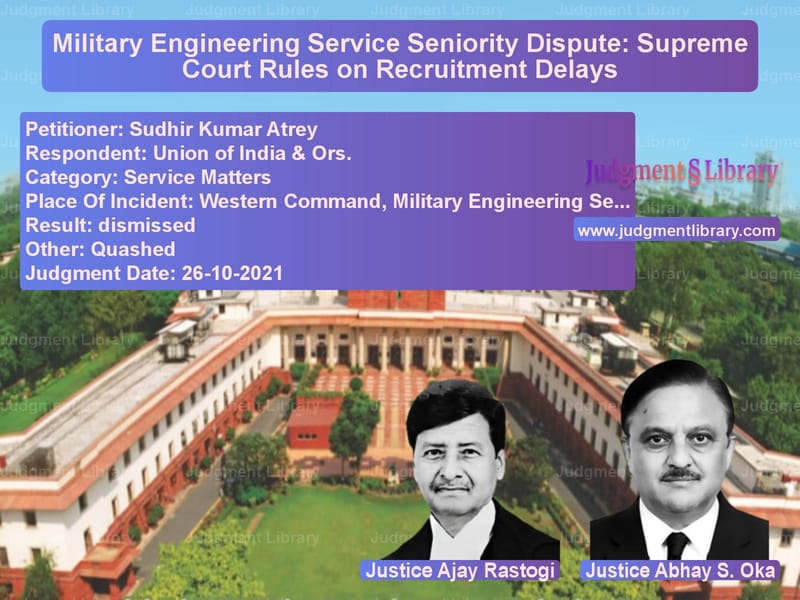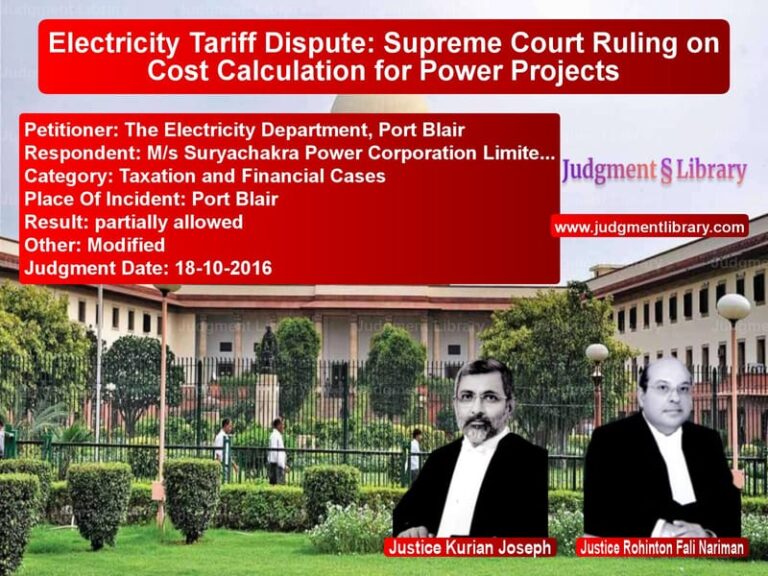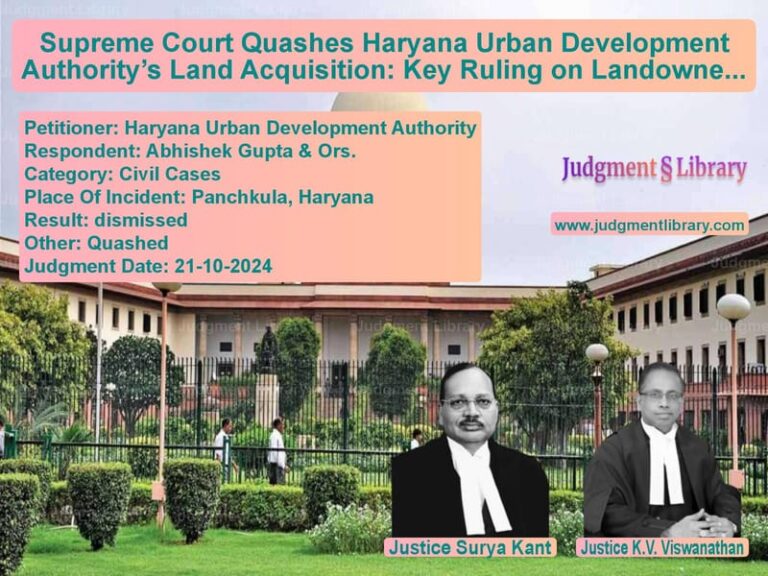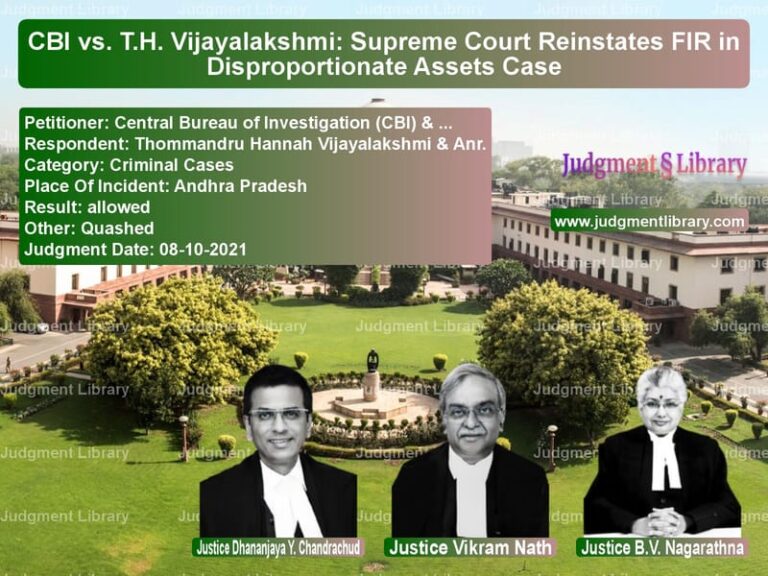Military Engineering Service Seniority Dispute: Supreme Court Rules on Recruitment Delays
The Supreme Court of India, in the case of Sudhir Kumar Atrey v. Union of India & Ors., addressed a crucial legal issue concerning inter-se seniority in the Military Engineering Service (MES). This case, Civil Appeal No. 6315 of 2021, arose from an appeal challenging the delayed appointments and subsequent seniority disputes among personnel in different commands of MES. The Supreme Court, in its judgment dated October 26, 2021, delivered by Ajay Rastogi and Abhay S. Oka, ruled on the correct method of determining seniority among candidates selected in the same recruitment process but appointed years apart.
The dispute revolved around whether seniority should be determined based on date of selection or actual date of appointment. The Court’s decision would impact not only the petitioners but also similar cases in the future involving administrative delays in government job recruitments.
Background of the Case
The Military Engineering Service (MES) is divided into five regional commands: Eastern, Western, Northern, Southern, and Central. Each command is administratively headed by a Chief Engineer. The dispute arose due to delayed appointments of certain candidates from the Western Command’s recruitment panel of June 29, 1983. Despite being selected in 1983, some candidates were appointed only between 1987 and 1988. Meanwhile, their batchmates who were appointed earlier had already been promoted to higher posts.
The recruitment was conducted independently in each command, but after appointments were made, a consolidated all-India seniority list was prepared. The key issue was whether candidates appointed much later from the same recruitment process should be granted seniority from their date of selection or their actual date of joining.
Key Legal Questions
The Supreme Court had to address the following legal issues:
- Should seniority be determined based on selection date or actual appointment date?
- Were the appointments made after five years from the select panel legally valid?
- Should late appointees claim retrospective seniority over those who joined earlier?
- How should administrative delays impact the rights of government job applicants?
Petitioner’s Arguments
The appellant, Sudhir Kumar Atrey, and similarly affected individuals contended that:
- They were selected in the 1983 recruitment panel but were appointed only in 1987 and 1988 due to delays by the administration.
- Under government rules, seniority should be determined based on merit order in the recruitment list, not the date of joining.
- Administrative inefficiency caused an unfair delay in their appointments, putting them at a disadvantage in career progression.
- The delayed appointment deprived them of opportunities for promotion and benefits that their batchmates enjoyed.
- Their junior candidates, who joined in 1983, had unfairly secured higher seniority and obtained promotions before them.
Respondent’s Arguments
The Union of India and other respondents countered that:
- Seniority should be based on actual date of appointment, not selection.
- The delay in appointment was due to vacancy constraints and was not arbitrary.
- The DoPT Office Memorandum (OM) dated July 3, 1986, which governs seniority, does not apply to different regional recruitments.
- If candidates are allowed retrospective seniority, it would disrupt the service hierarchy and unfairly disadvantage those who joined earlier.
Supreme Court’s Analysis and Judgment
The Supreme Court examined the recruitment process, seniority rules, and past precedents on similar disputes. The Court’s key observations included:
- Seniority is determined by date of joining unless specific rules state otherwise.
- Delayed appointments from the same recruitment process cannot claim retrospective seniority.
- The recruitment was regional, so the DoPT memorandum on central recruitments was inapplicable.
- The appointments made after five years were questionable, but since they were never legally challenged, they could not be undone.
Key Extract from the Judgment
“The appointment of individuals after five years from the select panel notified in 1983 in the Western Command cannot be countenanced by this Court, but in the peculiar circumstances, we are not inclined to open the dead issue at this stage.”
Final Verdict
- The Supreme Court dismissed the appeal, upholding seniority based on date of joining.
- The retrospective seniority claim of late appointees was rejected.
- The appointments made in 1987-88 were not overturned, but their seniority was fixed as per joining date.
- The Court directed that future recruitments should ensure timely appointments to avoid such disputes.
Impact of the Judgment
The Supreme Court’s ruling has significant implications for government job recruitments and seniority determination, ensuring:
- Seniority disputes due to administrative delays are minimized.
- Appointments must be made within reasonable timelines to prevent career disadvantages.
- Future recruitments in military and civil services must follow clearer guidelines to avoid similar conflicts.
- Government employees must be vigilant in seeking timely legal remedies in case of unjustified appointment delays.
Petitioner Name: Sudhir Kumar Atrey.Respondent Name: Union of India & Ors..Judgment By: Justice Ajay Rastogi, Justice Abhay S. Oka.Place Of Incident: Western Command, Military Engineering Service.Judgment Date: 26-10-2021.
Don’t miss out on the full details! Download the complete judgment in PDF format below and gain valuable insights instantly!
Download Judgment: sudhir-kumar-atrey-vs-union-of-india-&-ors-supreme-court-of-india-judgment-dated-26-10-2021.pdf
Directly Download Judgment: Directly download this Judgment
See all petitions in Promotion Cases
See all petitions in Recruitment Policies
See all petitions in Public Sector Employees
See all petitions in Judgment by Ajay Rastogi
See all petitions in Judgment by Abhay S. Oka
See all petitions in dismissed
See all petitions in Quashed
See all petitions in supreme court of India judgments October 2021
See all petitions in 2021 judgments
See all posts in Service Matters Category
See all allowed petitions in Service Matters Category
See all Dismissed petitions in Service Matters Category
See all partially allowed petitions in Service Matters Category







